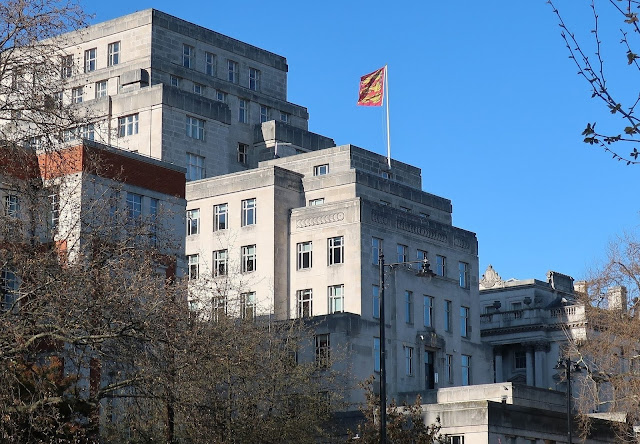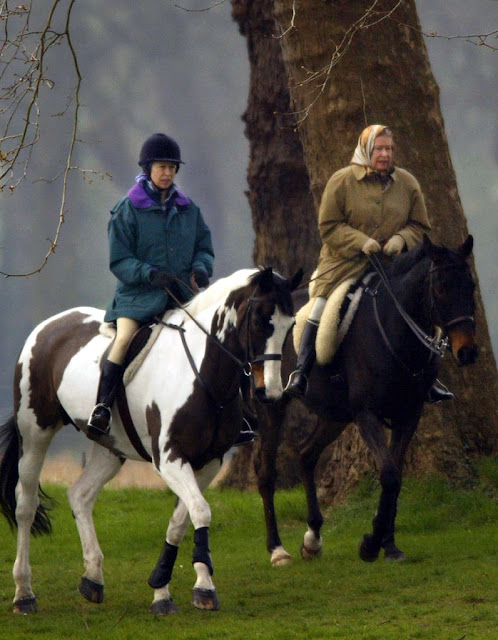Created in 1278, Andorra--located in the mountains between France and Spain--is ruled by a joint monarchy: the President of France and the Bishop of Urgell (currently the Archbishop Joan Enric Vives i Sicilia). Such a peculiarity makes the French President--in his capacity as Prince of Andorra--the only reigning monarch actually elected by a vote!
Speaking of Liechtenstein, on its national holiday, His Serene Highness, Prince Hans-Adam II (the head of state),
...invites residents for a party at Vaduz Castle.
The principality's national anthem is sung to the same melody as the United Kingdom's God Save the Queen (which America stole to sing My Country Tis of Thee).
The Grand Duchy of Luxembourg is another sovereign nation. It is reigned by a Grand Duke, who is its constitutional monarch.
The Grand Duchy of Luxembourg is another sovereign nation. It is reigned by a Grand Duke, who is its constitutional monarch.
In the 1400s, three members of the House of Luxembourg were Holy Roman Emperors. Then, the duchy was part of the Netherlands, until it won independence in 1867. The grand ducal family is very popular...
...and it has a ducal army of 800 soldiers. Not bad for a population of only 524,853. 1930s photographer, Edward Steichen, is a Luxembourgish celebrity.
A fellow named Ernst August is the Prince of Hanover, Duke of Brunswick. He is the head of the deposed Germanic Kingdom of Hanover (ended 1866) and titular sovereign of the defunct Duchy of Brunswick (ended 1918). *In North Carolina, Brunswick County is named for the duchy.
His brother-in-law is Prince Albert of Monaco, who rules the Principality of Monaco as its sovereign.
Since 1607, the Swedish Royal Court was overseen by a Marshal of the Realm. That monarch-appointed position is in charge of all palaces and Royal Family liaisons. Similar to a Chief of Staff, he works with a Marshal of the Court, the Governor of Royal Palaces, and staff of the King's Household.
It certainly creates a lot of jobs for the economy.
British aristocrats fare very well, too. (An aristocracy is a nobility with automatic positions in government). Acquired centuries go, many own land in central London. The Duke of Westminster's fortune increased by 170 million British pounds, in 2016. The Earl of Cadogan's fortune increased 800 million. Baroness Howard de Walden increased hers by 100 million. Viscount Portman increased his by 113 million. The Duke of Devonshire increased by 10 million (on paper).
His brother-in-law is Prince Albert of Monaco, who rules the Principality of Monaco as its sovereign.
His ancestry hails from the House of Welf.
The House of Welf is a dynasty that included German, British, and Russian monarchs since the 11th century. Its most recent offspring was born in 2006.
Born in 1959, Prince Sehzade Mehmed Celaeddin Efendi Hazretleri is the ancestor to the imperial Sultans and Caliphs of the extinct Ottoman Empire.
In other arenas of nobility, Louis Alphonse, Duke of Anjou, is called a "pretender" to the defunct French monarchy via its Bourbon family tree. Officially titled His Royal Highness, Prince de Bourbon, he is also titled His Royal Highness, Duke of Touraine. He also claims to be Grand Master of two dynastic orders: Order of the Holy Spirit and Order of Saint Louis.
His competition for the defunct French kingdom is Henri d'Orleans, the Count of Paris and Duke of France, via the monarchy's Orleans family tree. Married to the Duchess of Montpensier, his 5 children are each Princes and Princesses. One daughter married Prince Gundakar of Liechtenstein. A son is the Duke of Vendome (like the famous palace), and another is Duke of Angouleme. In his spare time, the duke is a painter and launched his own perfume.
Fashion enterprises occupy the time of other royals and nobility. Her Royal Highness, Princess Sirivannavari Nariratana of Thailand is a clothes designer under her own label.
His competition for the defunct French kingdom is Henri d'Orleans, the Count of Paris and Duke of France, via the monarchy's Orleans family tree. Married to the Duchess of Montpensier, his 5 children are each Princes and Princesses. One daughter married Prince Gundakar of Liechtenstein. A son is the Duke of Vendome (like the famous palace), and another is Duke of Angouleme. In his spare time, the duke is a painter and launched his own perfume.
Fashion enterprises occupy the time of other royals and nobility. Her Royal Highness, Princess Sirivannavari Nariratana of Thailand is a clothes designer under her own label.
In the Kingdom of Belgium, Countess Isabelle de Borchgrave d'Altena recreates historic clothes as wearable artwork.
Her Highness, Sheikha Mozah bint Nasser Al Missned of Qatar customizes couture looks.
One client is Her Majesty the Queen of the Hashemite Kingdom of Jordan... famous for her Muslim fashion sense.
Since history--and inbreeding--began, most royalty was a tight-knit circle. Her Royal Highness the Crown Princess Pavlos of Greece is also the Princess of Denmark. Her husband, the Prince of Greece was born in London, raised in Hong Kong, and schooled in Switzerland. Using her name Marie-Chantal as her fashion label, she attired guests for the wedding of her husband's cousin: Princess Madeline of Sweden.
The "godmother of Europe", Swedish Crown Princess Victoria is godmother to 18 of Europe's up-and-coming young royals.
She has "Grand Cross" honors from Austria, Belgium, Brazil, Bulgaria, Denmark, Estonia, Finland, France, Germany, Greece, Iceland, Japan, Jordan, Latvia, Lithuania, Luxembourg, Malaysia, Monaco, Norway, Romania and Tunisia. When she ascends to replace her father, she'll be the fourth Swede queen; the last was in 1720.
Since 1607, the Swedish Royal Court was overseen by a Marshal of the Realm. That monarch-appointed position is in charge of all palaces and Royal Family liaisons. Similar to a Chief of Staff, he works with a Marshal of the Court, the Governor of Royal Palaces, and staff of the King's Household.
The U.K.'s royal household is immense, starting with the Great Officers: Lord Chamberlain, Lord Steward, and Master of the Horse. Then comes the Private Secretary to the Sovereign, Defense Services Secretary, Keeper of the Privy Purse, Master of the Household, Comptroller, Ecclesiastical Household, Crown Equerry, Chancery of the Orders of Knighthood, Marshal of the Diplomatic Corps, College of Arms, Master of the Queen's Music, Royal Astronomer, Poet Laureate, Marker of the Swans (with his own annual ceremony on the river), Keeper of the Jewels, Sergeant-at-Arms (personal legislative attendant), governmental Chief Whip in the House of Lords, Captain of the Yeoman of the Guard, Ladies-in-waiting, Baronesses-in-waiting (both personal assistants of noble birth), Pages of Honour (boys), Piper to the Queen, Royal Physician, and Aides-de-Camp to the Queen (in three branches of the military). Another Royal Household exists in Scotland. A separate Household serves the queen's husband, Prince Philip (seen below).
Their heir, Prince Charles, has a larger one than his father: Principal Private Secretary, Private Secretary, Deputy Private Secretary, Assistant Private Secretary, Treasurer, Master of the Household, Deputy M of H, Equerry, and Press Secretary.
That's not surprising, considering that since the 1300s, the British monarchy receives income from its lands. Today's monarchy is a business-like company.
Created in 1351 and now worth $472 million, the Duchy of Lancaster (flags seen above) is a prime example. The British monarch is automatically the Duke of Lancaster and collects tax-exempt revenue from its 45,000 acres of farms, urban development, and commerce: $16 million per year. However, the Queen voluntarily pays income tax and capital gains tax on that income. As an asset to the Crown, the royal dukedom is not owned by the monarch; it is bequeathed to the next monarch.
Their heir, Prince Charles, has a larger one than his father: Principal Private Secretary, Private Secretary, Deputy Private Secretary, Assistant Private Secretary, Treasurer, Master of the Household, Deputy M of H, Equerry, and Press Secretary.
That's not surprising, considering that since the 1300s, the British monarchy receives income from its lands. Today's monarchy is a business-like company.
The same applies to the Duchy of Cornwall, established in 1337 as an income-provider for the British heir-to-the-throne (who is also conferred with the title: Prince of Wales). The current Duke of Cornwall makes eco-friendly, inventive, and sustainable revenue from his land and reinvests profits for the welfare of his tenants, farms, charities, and businesses.
British aristocrats fare very well, too. (An aristocracy is a nobility with automatic positions in government). Acquired centuries go, many own land in central London. The Duke of Westminster's fortune increased by 170 million British pounds, in 2016. The Earl of Cadogan's fortune increased 800 million. Baroness Howard de Walden increased hers by 100 million. Viscount Portman increased his by 113 million. The Duke of Devonshire increased by 10 million (on paper).
In the Middle East (the cradle of humanity), the tiny Kingdom of Bahrain was the first in that region to develop an economy that didn't depend on oil. The island-nation is a financial center and tourist site.
On the other side of the globe, the 125th emperor of Japan leads a lively family. He tours the world to make amends for prior wartime atrocities, in consideration of Japan's mostly peaceful history. Japan maintains its position as a powerhouse of innovation, balanced with a purity for doing things well.
While China's flabby monarchy famously imploded, other Asian ones remain stable. The King of Thailand is criticized for dictatorial powers that encourage a disparity of wealth. Yet, the kingdom is a mecca for cuisine and tourism. Bangkok is hyped for prostitution, as well as a haven for homosexuality.
Bhutan's mountainous kingdom is known for grand monasteries, serene happiness, and small-batch businesses.
The sexy Prince of Brunei gains more attention than his kingly father. Thanks to petroleum, their country has the highest Development Index in Southeast Asia, after Singapore.
The royal family in the Kingdom of Lesotho oversee swathes of African agriculture and livestock industries.
Malaysia has an elective monarchy. Many of its wealthy sovereigns invest in real estate development.































































"Such a peculiarity makes the French President--in his capacity as Prince of Andorra--the only reigning monarch actually elected by a vote!"
ReplyDeleteAre you forgetting the Pope - the Sovereign of Vatican City - or are you only counting direct election by the people?